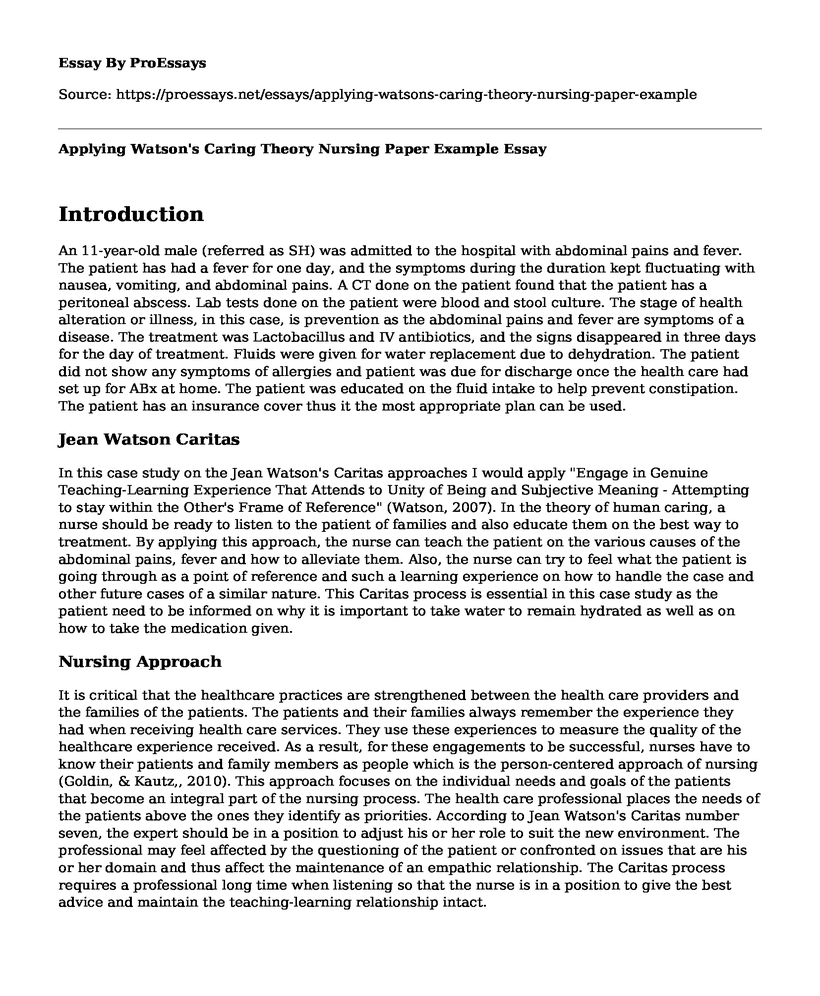Introduction
An 11-year-old male (referred as SH) was admitted to the hospital with abdominal pains and fever. The patient has had a fever for one day, and the symptoms during the duration kept fluctuating with nausea, vomiting, and abdominal pains. A CT done on the patient found that the patient has a peritoneal abscess. Lab tests done on the patient were blood and stool culture. The stage of health alteration or illness, in this case, is prevention as the abdominal pains and fever are symptoms of a disease. The treatment was Lactobacillus and IV antibiotics, and the signs disappeared in three days for the day of treatment. Fluids were given for water replacement due to dehydration. The patient did not show any symptoms of allergies and patient was due for discharge once the health care had set up for ABx at home. The patient was educated on the fluid intake to help prevent constipation. The patient has an insurance cover thus it the most appropriate plan can be used.
Jean Watson Caritas
In this case study on the Jean Watson's Caritas approaches I would apply "Engage in Genuine Teaching-Learning Experience That Attends to Unity of Being and Subjective Meaning - Attempting to stay within the Other's Frame of Reference" (Watson, 2007). In the theory of human caring, a nurse should be ready to listen to the patient of families and also educate them on the best way to treatment. By applying this approach, the nurse can teach the patient on the various causes of the abdominal pains, fever and how to alleviate them. Also, the nurse can try to feel what the patient is going through as a point of reference and such a learning experience on how to handle the case and other future cases of a similar nature. This Caritas process is essential in this case study as the patient need to be informed on why it is important to take water to remain hydrated as well as on how to take the medication given.
Nursing Approach
It is critical that the healthcare practices are strengthened between the health care providers and the families of the patients. The patients and their families always remember the experience they had when receiving health care services. They use these experiences to measure the quality of the healthcare experience received. As a result, for these engagements to be successful, nurses have to know their patients and family members as people which is the person-centered approach of nursing (Goldin, & Kautz,, 2010). This approach focuses on the individual needs and goals of the patients that become an integral part of the nursing process. The health care professional places the needs of the patients above the ones they identify as priorities. According to Jean Watson's Caritas number seven, the expert should be in a position to adjust his or her role to suit the new environment. The professional may feel affected by the questioning of the patient or confronted on issues that are his or her domain and thus affect the maintenance of an empathic relationship. The Caritas process requires a professional long time when listening so that the nurse is in a position to give the best advice and maintain the teaching-learning relationship intact.
The fact that the patient mom is at the bedside should be a guiding principle when handling her and her sick child. The nurse should explain to the mother the condition of her child and what needs to be done to treat the child. Also, the nurse should be in a position to explain to the mother on the need of her child taking fluids to avoid constipation during the time of medication and how to use the drug administered. The nurse should also explain that the child has no allergic condition and what should be done in the case that child showed any allergic signs.
References
Goldin,, M., & Kautz,, D. D. (2010). Applying Watson's Caring Theory and Caritas Processes to Ease Life Transitions. International Journal of Human Caring, 14(1), 11-14. doi:10.20467/1091-5710.14.1.11
Watson, J. (2007). Watson's theory of human caring and subjective living experiences: carative factors/caritas processes as a disciplinary guide to the professional nursing practice. Texto & Contexto - Enfermagem, 16(1), 129-135. doi:10.1590/s0104-07072007000100016
Cite this page
Applying Watson's Caring Theory Nursing Paper Example. (2022, Sep 22). Retrieved from https://proessays.net/essays/applying-watsons-caring-theory-nursing-paper-example
If you are the original author of this essay and no longer wish to have it published on the ProEssays website, please click below to request its removal:
- Paper Example on Effectiveness of Community Based Food Programs
- Impact of Sids Public Health Campaign on Infant Mortality Rate in the US - Essay Sample
- Research Paper on Drones: Reducing Accidents, Enhancing Real-Time Data & More
- Essay Example on Vaping Devices: Benefits & Risks of Nicotine-Based E-Liquids
- Essay on House Passes Strengthening Health Care & Lowering Prescription Drug Costs Act
- Essay Example on Breastfeeding: Essential Nutrients, Jaw Exercise, and Health Benefits
- Essay on the Gut Microbiome: Connecting Obesity and Bariatric Research







